SUMMARY
This is AI generated summarization, which may have errors. For context, always refer to the full article.

Once more we have a whole nation abnormally riveted on the results of the Bar examination. Actually we should be more excited when a Filipino earns a PhD in Physics, but there is a fascination with the Bar, because of the myth that has grown around it.
Justin De Jesus Sucgang is right – the cult is fostered by those who think of it as coveted membership in an exclusive club. Harry Roque is also right: It is very, very wrong to make competence depend on passing the Bar.
Understandably, those who pass are jubilant. We congratulate them. But those who did not pass, was it because they were weak, dense, stupid, dim-witted? Circumstances give us reason to pause. When you have 26% or so passing the examination, a good educator will ask himself: Are the students to blame, or might there be something amiss with the exam itself?

Preparing an examination is a science: test construction, evaluation, and measurement. There are considerations such as predictive validity to consider. There are requisite tools, such as a Table of Specifications.
The Bar examiners, however, are selected (secretly) from the ranks usually of practitioners, some of whom may have never even prepared a quiz all their life, and who can neither make sense of the principles of test construction nor know how to use a Table of Specifications.
When you ask, for example, what “the Jason Clause” is, exactly what thinking skill in Bloom’s revised taxonomy of educational objectives are you targeting? Why is such a question warranted, given the wide swath of transportation law, and the equally broad sweep of maritime law? In other words, why pick precisely on that? The answer cannot be “Because I want to.” That would be whim, and constructing tests is not about whim.
So, I go with the Legal Education Board (LEB) project and will fully support it. Let us stop deceiving ourselves. Obsession with the Bar is what has truncated Philippine legal education, and let’s learn from other jurisdictions what evaluative tools they use.

Seldom do passers in the Bar examination ever go beyond 40%. That means that, in general, 60% do not make it. If most of the products of a program do not make it, generally the educator will say: The program is broke. But all this time, we have been insisting: The examinees are broke… In a supreme act of injustice to them, and in an unbelievable option on our part as legal educators to remain intransigent about a really stupid position.
Congratulations then to the LEB for its initiative at veering legal education away from the Bar and making legal educators true educators, using educators’ tools, and learning educators’ science, rather than incidental teachers, or recreational teachers – for whom classroom teaching is recreational, after a day in court or in corporate boardrooms.
I look forward to the day that the fitness of the law graduate will be determined by more intelligent devices than a test that strikes anywhere, and the Bar shall be relegated to a still nerve-wracking exercise, yes, but of no more significance and fanfare than a final exam! These are my thoughts both as an educator and as an earnest student of the law. – Rappler.com
The author is Dean of the Graduate School of Law, San Beda College.
Add a comment
How does this make you feel?
There are no comments yet. Add your comment to start the conversation.